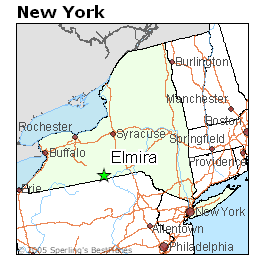 The southern tier city of Elmira, N.Y. is not too happy with Time Warner Cable’s lock on the local cable market.
The southern tier city of Elmira, N.Y. is not too happy with Time Warner Cable’s lock on the local cable market.
“There’s no competition so their prices continue to go up, their offers continue to go down, and the people here with no other competition are just paying and paying and paying,” Elmira mayor Sue Skidmore told WETM News.
Skidmore and the city council intend to hold public hearings on the cable operator’s franchise renewal before they attempt to negotiate the next 10-year agreement with the cable company.
“This gives the public an opportunity to come and say anything good or bad pertaining to the cable franchise,” said city manager John Burin. The public meeting is scheduled for 7pm, June 4, on the second floor of Elmira City Hall.
The city’s ability to press Time Warner Cable for lower rates or service changes are extremely limited, however. Wholesale deregulation of the cable television industry has allowed most cable operators to manage their systems as they see fit, with no obligation to accept the recommendations of local government.
This fact of life was underscored when Time Warner mailed its own vision of what a renewal agreement with the city should look like, prior to any public discussion.
The city’s lawyer, John Ryan Jr., told the Ithaca Journal the company deleted several provisions in the proposed renewal agreement that are part of the current agreement. Ryan intends to speak with the operator about those changes, and wants to see changes in the city’s favor.
In most franchise renewal agreements, the only leverage a city typically has is to threaten not to renew a cable franchise. That is a very rare occurrence, however, because it is exceptionally rare for another major cable provider to agree to service a city that cancels a franchise renewal with another company. In the end, most renewal agreements come down to handshake agreements to correct any long-standing service issues, agree to wire certain unserved areas, and negotiate over public, educational, and government access channels and franchise fees payable to the city.
The local telephone company, Verizon Communications, has no plans to provide its FiOS fiber optic service in the city, leaving customers with the competitive option of landline phone service, DSL, and a contract with Verizon’s satellite TV partner, DirecTV.
[flv width=”360″ height=”290″]http://www.phillipdampier.com/video/WETM Elmira City Of Elmira To Negotiate With Time Warner Cable 5-21-12.mp4[/flv]
WETM in Elmira reports city officials are preparing for franchise renewal discussions with Time Warner Cable. The cable company is already on that, preemptively sending the city a franchise renewal agreement it wrote itself. (1 minute)


 Subscribe
Subscribe








